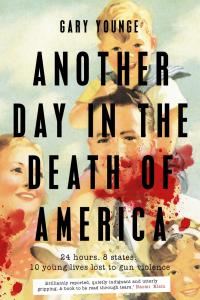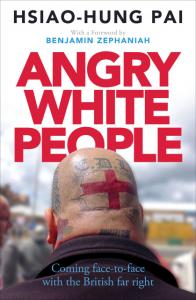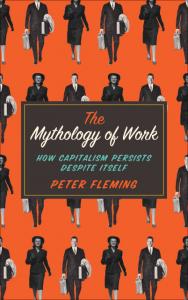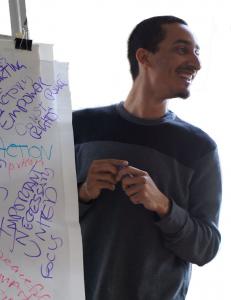How should we respond here in the UK to the Trump presidency? For a number of reasons, we should not focus on Trump himself – on boycotts of outlets that carry Trump-branded goods, for example.
Following Erika Thorne’s wise words elsewhere in this issue, we can focus instead on those leadership can help us turn back the dangers that confront us, those who are most threatened by Trump’s rise.
There are some inspiring things happening in the US.
I was moved…
Class
Class
Class
Last year, excluding suicides, over 13,000 people in the US – including roughly 2,500 children and teenagers – were killed by firearms. In 2012 – the most recent year for which comparable statistics are available – the number of gun murders per capita in the US was nearly 30 times that in the UK.
Yet, though ‘each individual death is experienced as a family tragedy that ripples through a community,’ notes Gary Younge ‘the sum total barely earns a national shrug’. Indeed, with the…
Hsiao-Hung Pai is a Taiwanese writer who has lived in London’s East End since 1991. Over three years she spent many hours interviewing far-right extremists and campaigners, often maintaining contact with them.
’Their faces on the TV screens and the front pages of newspapers show such deep anger, hatred and, above all, alienation, yet no explanation is ever given’, she writes. ‘Surely, I thought to myself, no one’s born a bigot. So what are the circumstances that have driven them…
Brexit hasn’t just been a shot in the arm for people on the Right, it’s kicked a lot of Greens, anarchists and socialists into positive action. The vote on 23 June to Leave the EU has energised progressive people in a lot of places around the UK to put renewed energy into tackling racism…
In this issue, we are offering some resources for campaigners struggling for peace and justice in post-Brexit Britain. Here is an excerpt from Linda Stout’s invaluable book, Bridging the Class Divide – and other lessons for grassroots organising. In this book, Linda explains how she, a white woman who grew up in poverty in rural North Carolina, founded and built up…
With hundreds of volunteer leaders and 65 member groups across Oregon, the Rural Organising Project is a powerful example of a statewide social justice organisation with a statewide strategy. At the centre of their work for peace, justice and democracy is an organising strategy to develop anti-racist politics, leadership, and action in rural white…
For some decades, Betsy Leondar-Wright has been running workshops about classism, for the last dozen years as part of Class Action, a group based in Boston, Massachussetts, in the US.
In an interview with PN, Betsy notes that many of us have a picture we’ve built up from the women’s movement and other such movements: ‘We have a template: there’s a dominant group, there’s a targeted group/an oppressed group, and in Class Action we’re using this template all the time.’…
How should a white anti-racist respond to racist remarks by another white person? How does it change things if the anti-racist is middle-class, and is reacting to the prejudice of someone who is working-class?
In her book Class Matters, long-time activist and trainer Betsy Leondar-Wright tells an arresting story that turns the conventional wisdom on its head. Betsy, who is white and middle-class, was the…
I first came across Betsy Leondar-Wright through her book, Class Matters: Cross-Class Alliance Building for Middle-Class Activists (New Society Publishers, 2005). An intriguing subtitle! In conversation with her, over Skype, I found out more about how that wonderful book came to be.
Betsy was then working at United for a Fair Economy (UFE) a US NGO based in Boston, Massachusetts. (‘United for a Fair Economy challenges the concentration of wealth…
Betsy Leondar-Wright, the programme director of Class Action on the south side of Boston, is a bright-eyed, sparkling, high-energy interviewee. She speaks faster than anyone I’ve ever had to transcribe before, and laughs throughout our 90 minutes on Skype, despite talking about some pretty challenging issues. She is candid about her own past shortcomings, and respectful to people she has disagreed with.
I can’t imagine anyone not liking her.
Betsy is especially excited…
Capitalism is often thought of as driven by elites bent on attacking the lower classes. The enemy is clearly defined, the targets obvious. All we need to do is redistribute wealth and minimise their control.
In this lively if unhelpful book, Peter Fleming subscribes to this view wholesale, discussing ‘the palpable hatred that the neoliberal state apparatus has for most working people’, treating them ‘as if they are an “enemy within” requiring constant harassment and purging’.…
Just after I sent a note to an email list about ‘class’, occasioned by friendly comments I had from a couple of conservatives about a cartoon I’d sent, I thought of an excellent example of the ‘class attitudes’ of those in the working class, which I should have mentioned.
Again, it isn’t a matter of virtue, right and wrong, etc, but simply a difference in class attitudes.
The year was probably 1951, the place was Ocean Park, California, and I was a student at UCLA.…
Pregnant woman at a public Women
Infants and Children clinic, Virginia, USA.
photo: Ken Hammond (USDA)
I know what they say about poor girls.
Tryin’ to get pregnant to keep a boy around.
Havin’ babies to get a welfare cheque.
Trappin’ men by tellin’ ’em they’re on the pill when they’re not.
I don’t even recognize what people say about poor girls though.
Trying to get pregnant?
All my life I’ve been with girls and women doing everything…
Betsy Leondar-Wright, Missing Class: How Seeing Class Cultures Can Strengthen Social Movement Groups
I cannot recommend Missing Class too highly. Studying this book – and acting on its insights – will make our movements stronger.
Some books stimulate you intellectually – you end up seeing the world a different way. Some books deepen awareness – you finish them with a greater understanding of yourself, and of the web of relationships that you are part of. Some books are practical; full of immediately-useable how-to tips.
It’s rare to find a book that does one…
I want to give a warning shot to anti-oppression trainers and activists. My bottom line is this: we need to stop applying theory onto people’s experiences, wielding it like a weapon to describe what we believe whether we actually see it in a room or not. It’s not smart organising, creates intense backlash, and shrinks – not grows – our movements.
An organiser recently shared with me an example of what I’m talking about.
He was working in a union that represents workers at a…












